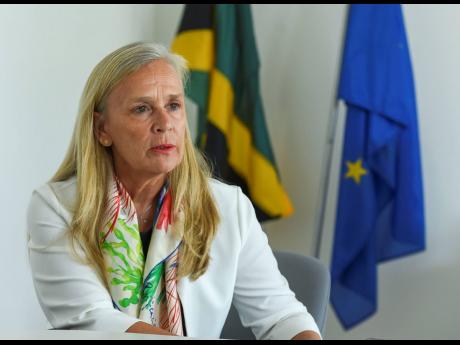Unfulfilled trade potential
In parting shot, outgoing ambassador says EU-Jamaica deal failing to deliver
Sixteen years after Jamaica and the European Union (EU) struck a duty-free deal, shelves devoid of each other’s goods on both sides have left former EU Ambassador Marianne Van Steen and local business leaders disheartened.
Van Steen, whose tour of duty ended on August 7, told The Sunday Gleaner that Europeans are eager to see Jamaican products in their markets, while those in Jamaica aren’t finding familiar European goods.
“Back in 2008, we said, ‘We are big and you are a small country. You can come in immediately with your goods – duty-free goods – on our market of 50 million consumers’,” she said of the CARIFORUM-EU Economic Partnership Agreement signed in October 2008.
“That’s a huge market, but we did not want to overwhelm Jamaica with European goods. So we said, on a transitional basis, we want you to let our goods come to your market. ... So for every type of goods, you have a different timetable. It’s not just about the cars. It’s about cheese, it’s about ham, it’s about anything – even popcorn,” she noted.
In 2023, the EU was CARIFORUM’s second-largest trading partner after the United States. The main exports to the EU from CARIFORUM – which comprises 14 Caribbean Community states and the Dominican Republic – were crude oils and liquefied natural gas, chemicals (particularly methanol, and fertilisers), medical instruments, and traditional products like bananas, rum, cocoa and tobacco. The main imports into the CARIFORUM region from the EU are machinery and appliances, boats, ships, vehicles, potatoes, milk and cream, pharmaceuticals, and spirit drinks.
“The agreement is both ways,” Van Steen stressed. “Since 2008, all the products that you (Jamaica) have – industrial, agricultural, any product – can go to the EU market without paying import duties. For us at the EU, it is over time. So, ... we have unfinished business in trade,” she said in an exclusive interview with The Sunday Gleaner.
“We would love to see more Jamaican and Caribbean goods coming to Europe. There are lots of things, in terms of volume, let’s, say, of agricultural products, but that would be hard because there is not that much surplus as the country is more importing than exporting. But there are some niche products that Europe would really be interested in,” Van Steen said.
The former EU head of delegation said Jamaica needs to evaluate the products it can put forward to compete in the European market, adding that rum cake, ginger and limes – natural and organic – would be natural fits.
While Van Steen would like to see more European goods in Jamaica, she said the climate has to be more attractive as companies want to ensure there is a return on investment. She sees great potential for competitively priced goods, “as, comparatively, supermarket prices are very expensive in Jamaica”; however, the small economy is an issue weighing on the minds of investors as well as the cumbersome procurement rules.
Private Sector Organisation of Jamaica (PSOJ) President Metry Seaga said there is merit to Van Steen’s argument.
“I agree, but the truth is, some of those markets are very difficult to access, especially the European markets, for small manufacturers. And that’s why we have to start looking at mergers and acquisitions so that companies can collaborate to become bigger companies so that that they can play in bigger markets of that size,” he told The Sunday Gleaner.
“So we have not used that EU market at all and we have not used that Caribbean Basin Initiative (CBI), which gives us duty-free access in the United States either. We have not used either of them, and both are good markets for us,” added Seaga, who is a former president of the Jamaica Manufacturers and Exporters Association and the vice chair of Jamaica Promotions (JAMPRO).
He noted that the larger companies such as GraceKennedy and Jamaica Producers have done a lot of work in the space, and while a few smaller entities have also sent goods to Europe, it is still a drop in the bucket.
He also agreed that there is still too much red tape.
“The procurement process is prohibitive and needs to be addressed, and I have spoken to it for many, many years. ... The EU is not an easy market to access. With shipping and regulations and things like that, it makes the process difficult. I am not saying we don’t need to do it, but it is going to take some time and effort, and we at the PSOJ are trying to do as much as we can,” he contended.
For years, Jamaica enjoyed preferential treatment with the United Kingdom via bilateral arrangements for traditional agricultural products. When the UK withdrew from the EU in 2016, it relied upon these bilateral agreements.
Jamaica Agricultural Society (JAS) President Lenworth Fulton said no one is benefiting from the current arrangement with the EU.
“What the EU has actually done, in a very benign way, is to tell us that they’re finished with us with respect to traditional crops, although Europeans still want those products, especially bananas. But in terms of sugar and bananas, they have given us massive grants to get rid of us … ,” Fulton told The Sunday Gleaner.
“There was a big banana grant when they stopped taking our bananas. The grant was for us to diversify from banana, and they did they did the same thing with sugarcane, but we wasted the money,” he added.
Despite the ending of that regime in 2017, the EU granted J$677.85-million (€5 million) to revitalise Jamaica’s banana sector to spur increased production and other key outcomes, following fallouts by hurricanes and tropical storms and other weather-related events. Approximately 1,600 farmers were expected to benefit.
Nearly J$1 billion was also granted for the rehabilitation of rural communities that were dependent on sugar.
Fulton said the preferential agreement with the UK was disturbed by the European Common Market.
“The market with the UK still exists, but we need a trade mission to the UK to deal with their people to sort out the issues. I don’t think we have a solid agreement because what we are doing now is trying to export company to company. If we straighten out these agreements, it will be easy to get goods into Europe. Though transportation would be more expensive, their phytosanitary rules are much more relaxed than the USA,” he explained.
“It would be easier to enter the EU market. For example, we use the Jamaica Agricultural Commodities Regulatory Authority (JACRA) to be fooling around, licensing people selling coffee and cocoa. What we find is that the right market in Europe will take your coffee or cocoa. They know the quality they want and the amount they want. What we have is a supply problem because we do not have enough to supply. We are not planting enough,” he told The Sunday Gleaner.
The JAS president argued that JACRA’s standard requirement for farmers is also prohibitive, noting that it is more stringent than some of the overseas companies, whose main concerns are quality and quantity.
But beyond goods, Van Steen said Jamaica could also market services, including music, movies, art and creative industry offerings, some of which are already popular or would generate interest in Europe.
“I think the creative industry is one that I am looking at, incentivise exports to Europe, and I would really not go into the traditional, but look for niche products … .
“But since we are talking about trade, I find it sad how few European products reach Jamaica. We have been working on that, but I can’t go into any discussions I may have. It’s unfinished business,” she told The Sunday Gleaner. “We can do a lot more in that area. There are a couple of things that we are discussing with the Government on how we can identify the real obstacles that we find dissuasive, like, why would an Italian company decide to come here and import product A, B, or C? They may think that Jamaica is far away and they may not like our goods, and we will have difficulty getting it on the market,” she reasoned.



